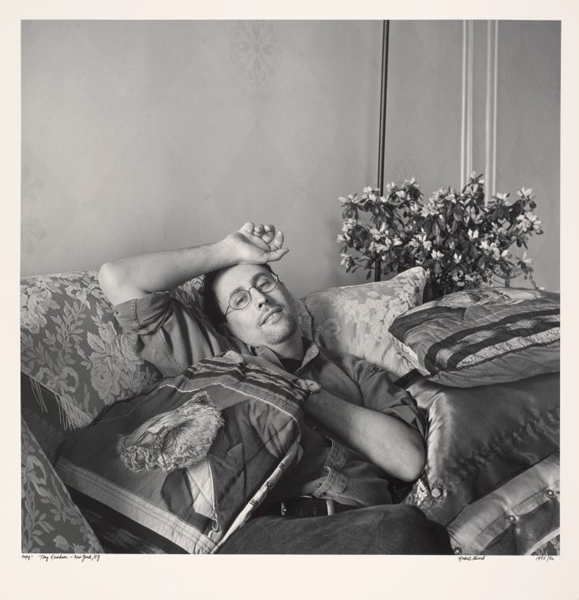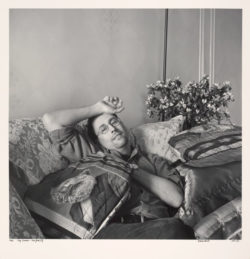Tony Kushner
Playwright Tony Kushner, one-time resident of Lake Charles, is the author of prizewinning drama "Angels in America."

Courtesy of New York Public Library
Tony Kushner with Karl Marx Pillows. Giard, Robert (Photographer)
Tony Kushner stands as one of the most significant contemporary US playwrights. Although he wrote plays throughout the 1980s, he gained enormous acclaim in the 1990s for Angels in America: A Gay Fantasia on National Themes. This two-part epic play explores sexual, ethnic, racial, and religious identity during the 1980s and the onset of AIDS. Since then, the prolific and often politically provocative Kushner has written essays, editorials, and prefaces, as well as other plays. These include his collaboration on the esteemed musical Caroline, or Change, which draws heavily upon Kushner’s Louisiana childhood.
Kushner was born in New York City on July 16, 1956, to classical musicians William Kushner and Sylvia Deutscher. The family soon moved to Lake Charles, where they were part of a decidedly minority Jewish presence in southwestern Louisiana. There Kushner spent his childhood and was educated. He returned to New York City in 1974, taking an undergraduate degree in medieval studies from Columbia University in 1978 and a graduate degree in directing from New York University in 1984. While completing the latter, Kushner spent several summers working with the Governor’s Program for Gifted Children affiliated with McNeese State University in Lake Charles, directing his own apprentice plays and Shakespearean classics.
Kushner’s early plays include A Bright Room Called Day, based on Bertolt Brecht’s The Private Life of the Master Race; Hydriotaphia; and The Illusion, adapted from Pierre Corneille’s L’Illusion Comique. These plays often had long production histories, as did Angels in America. Throughout the early 1990s, both Part One: Millennium Approaches and Part Two: Perestroika were revised via workshop and staged readings, premieres, and London openings before arriving on Broadway in 1993. However, after Millennium Approaches opened on May 4 and Perestroika on November 23, the plays basked in critical praise and garnered numerous awards, including two Drama Desk awards and two Tony awards for best play, as well as a Pulitzer Prize for drama.
Kushner’s recent plays include Slavs! Thinking about the Longstanding Problems of Virtue and Happiness; Homebody/Kabul; Terminating, or Lass Meine Schmerzen Nicht Verloren Sein, or Ambivalence, in Love’s Fire; and The Intelligent Homosexual’s Guide to Capitalism and Socialism with a Key to the Scriptures. He has also translated Brecht’s The Good Person of Szechuan and Mother Courage and Her Children, adapted S. Ansky’s play The Dybbuk, and co-written, with Eric Roth, the 2005 screenplay for Stephen Spielberg’s film Munich. Kushner’s second screenplay for Spielberg, Lincoln, a film released in 2012, was nominated for an Oscar.
Although Kushner’s work has been most centrally informed by his Jewish and gay identities (he married editor and longtime partner Mark Harris in 2003), Kushner drew extensively upon his childhood in Lake Charles for Caroline, or Change. Set in that city in the fall of 1963, the musical focuses on an African American maid, Caroline Thibodeaux, employed by a family of Jewish musicians displaced from New York City to southwestern Louisiana. Working under the auspices of The Public Theater in New York City, Kushner wrote both the book and the lyrics, and Jeanine Tesori composed the music. After a series of workshops and premieres, Caroline, or Change opened on Broadway on May 2, 2004, and, critically acclaimed, ran for 136 performances.
